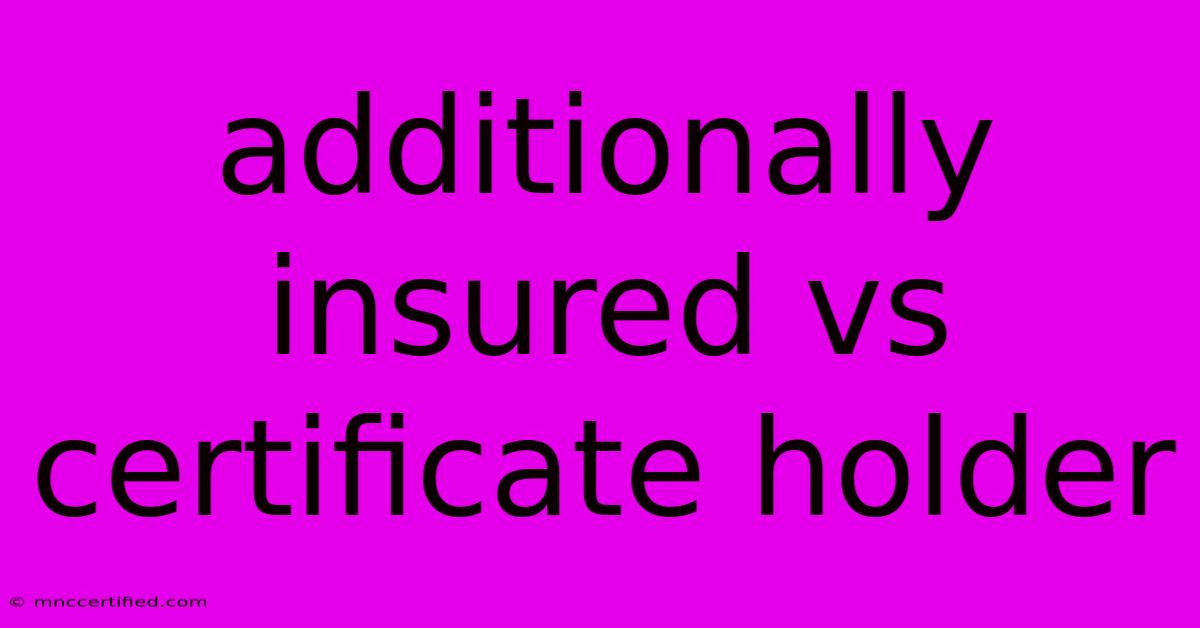Additionally Insured Vs Certificate Holder

Table of Contents
Additionally Insured vs. Certificate Holder: Demystifying the Difference
In the world of construction and insurance, the terms "additionally insured" and "certificate holder" often get thrown around, sometimes interchangeably. While they might seem similar, they represent distinct roles and implications within a project. Understanding the difference between these two concepts is crucial for ensuring proper coverage and avoiding potential financial liabilities.
What is an Additionally Insured?
An additionally insured is an individual or entity that is added to an existing insurance policy, granting them coverage under that policy. This means they are protected by the same insurance as the named insured, typically the general contractor or property owner.
Here's how it works:
- Named insured: The primary party on the insurance policy, usually the one who purchased the insurance.
- Additionally insured: A secondary party who is added to the policy, usually through an endorsement or rider. They gain coverage alongside the named insured, but not as the primary party.
Why is it important to be additionally insured?
Being named as an additionally insured provides protection from potential liabilities that could arise during a project. This is especially important for subcontractors, suppliers, and other parties involved in construction projects who may be exposed to risks like:
- Property damage: Accidental damage caused to the project site, materials, or surrounding property.
- Bodily injury: Injuries sustained by workers or members of the public.
- Environmental damage: Contamination or pollution caused during the project.
Benefits of being additionally insured:
- Protection from claims: An additionally insured party is shielded from financial liability in case of an incident covered by the policy.
- Peace of mind: It offers reassurance to parties involved that they are covered in case of an unexpected event.
- Contractual requirement: Often, contracts stipulate that certain parties must be added as additionally insured to ensure adequate coverage.
What is a Certificate Holder?
A certificate holder is an individual or entity who receives a certificate of insurance (COI). The COI is a document that confirms the existence of an insurance policy and provides details about the coverage.
Here's how it differs from being additionally insured:
- No direct coverage: A certificate holder is not directly covered by the policy itself. They are simply provided with proof of insurance for the named insured.
- Verification of coverage: The COI serves as documentation that the named insured has adequate insurance, giving the certificate holder peace of mind about potential risks.
- Contractual requirement: Similar to being additionally insured, contracts often require the submission of COIs to demonstrate that parties have appropriate insurance coverage.
Key differences:
| Feature | Additionally Insured | Certificate Holder |
|---|---|---|
| Coverage | Directly covered by the policy | Not covered by the policy |
| Role | Secondary party added to the policy | Party receiving proof of insurance |
| Document | Policy endorsement or rider | Certificate of insurance (COI) |
When do you need to be Additionally Insured?
It's essential to determine whether being additionally insured is necessary for your specific project or contract. Here are some key situations where it's generally required:
- Subcontractors: Subcontractors working on construction projects often need to be added as additionally insured to protect themselves from liability.
- Suppliers: Suppliers providing materials or services for a project may also require additional insurance coverage.
- Property owners: Property owners may want to be additionally insured to protect their interests in case of accidents or damage to their property.
When do you need a Certificate Holder?
A certificate holder is primarily required for verification purposes. Here are some common situations:
- Lenders: Lenders often require COIs to ensure that the borrower has adequate insurance coverage for the property they are financing.
- Property owners: Property owners may request COIs from contractors and subcontractors to ensure they have proper insurance.
- Government agencies: Some agencies require COIs as part of their permitting or approval processes.
Conclusion
Understanding the distinction between being additionally insured and a certificate holder is crucial for navigating the complexities of construction projects and insurance requirements. By clarifying these terms and ensuring appropriate coverage, you can protect yourself from potential liabilities and maintain smooth operations on your projects.
Remember: Always consult with your insurance broker or attorney to determine the specific requirements for your project and ensure you have the necessary coverage.

Thank you for visiting our website wich cover about Additionally Insured Vs Certificate Holder. We hope the information provided has been useful to you. Feel free to contact us if you have any questions or need further assistance. See you next time and dont miss to bookmark.
Featured Posts
-
Flick Praises Pena Outlines Gavi Plan
Nov 07, 2024
-
Trumps Impact On Elon Musks Business
Nov 07, 2024
-
Trump Presidency Return Fuels Stock Market Surge
Nov 07, 2024
-
Senate Power Shifts To Republicans After Vote
Nov 07, 2024
-
How Long Does Bonding Last On Front Teeth
Nov 07, 2024